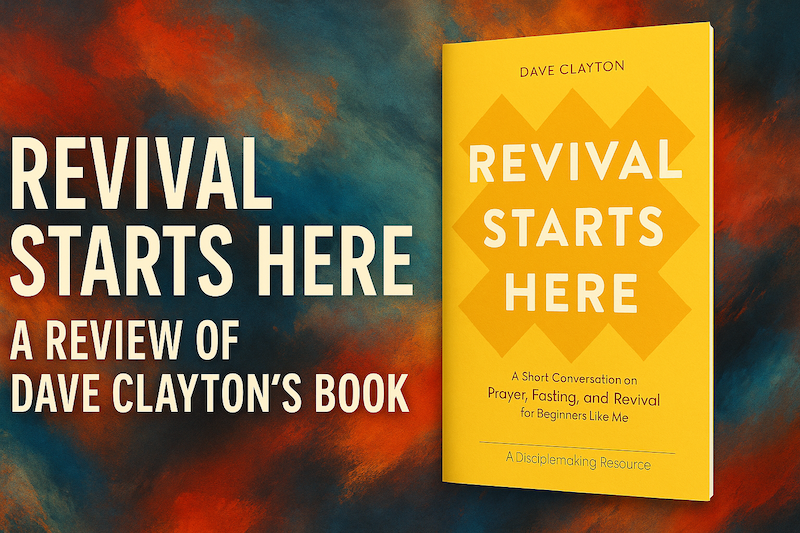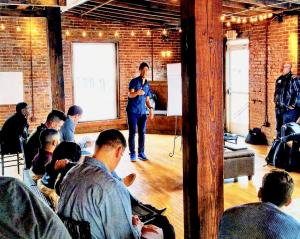
To lead a quiet life (the focus of this Lead a Quiet Life blog on Patheos), we must not only learn to slow down, but we must also learn what it means to be still with God in a way that we are dependent on and sustained by God. That kind of quiet, rooted living that I am learning to discover, and inviting you along for, comes from a constant state of realizing how we are being held by God. This incorporated spiritual disciplines and practices such as prayer and fasting that help us maintain our dependence through discipline. Disciplines help us understand God’s love more.
One of the disciplines we don’t talk about nearly enough in the United States is fasting. And yet, as Dave Clayton writes in Revival Starts Here, “You would be hard-pressed to find any significant movement of God across human history that was not first preceded by a group of faithful men and women who were committed to the Lord in prayer and thanksgiving” (p. 7). We don’t talk about fasting, because it takes discipline. However, it may bring us into an awareness of God’s love more than any other discipline.
This book has been super encouraging to me on my journey through life, and I wanted to review Revival Starts Here by Dave Clayton on this blog, to share it with others as well.
Encounter Revival Starts Here
I first encountered Revival Starts Here a few years ago, when I was serving as the Lead Pastor at East Petersburg Mennonite Church. I was part of the Exponential’s Multipliers Learning Community and met Dave Clayton. I found him super encouraging. At the time, our church was in a season that required spiritual clarity, there was a lot of breakthrough needed, and I sensed God calling me—and our team—to engage in prayer and fasting. This book became a practical guide for me during that season. I had quoted from it with my team, but we also practiced fasting together as we discerned important decisions, including staffing transitions.
More recently, I returned to read Revival Starts Here once again – this time as part of my doctoral studies. While I had hoped for more emphasis on prayer, Clayton’s insights on fasting are still incredibly helpful. It reminded me that revival isn’t sparked by effort alone, but by a posture of humility before God. I am sure in the days ahead, it will be inspiring some conversations and practically for me personally, and for River Corner Church, a simple community of Jesus followers, that I am blessed to serve as a pastor.

About Dave Clayton
As I shared, I first met Dave Clayton during my time in Exponential’s Multipliers Learning Community (2018-2019) — a cohort designed to help leaders navigate the future of the Church through peer learning and paradigm shifts. I was grateful to receive a grant that made my participation possible. During one of our gatherings, Dave shared about the work God was doing through Ethos Church in Nashville and the Awaken Nashville movement, which united more than 700 churches in a citywide effort of prayer and fasting. Dave’s humility, passion, and practical wisdom left a deep impression on me, and I was drawn to the way he spoke about prayer, fasting, and revival with both urgency and gentleness.
A Practical Resource and Conversation on Fasting
Revival Starts Here is short, readable, and rooted in Scripture. With the introduction and appendices, this book is just under eighty pages. As the tagline on the cover reads, it is “a short conversation on prayer, fasting, and revival.” It’s practical, not academic or theological —rather, it is designed for everyday followers of Jesus and entire church communities to engage with together. In this book, Dave writes from the angle of being on the journey with the reader, not as a professional.
In Part 1, Clayton opens by helping us see a future where our spiritual hunger—and our need for more of God—takes center stage. He writes, “This kind of future is only realized when the people of God become so collectively homesick for the kingdom of Heaven that we exchange our time, our comforts, our lives, and even our eating habits for more time in the presence of God” (p. 19). Fasting, he says, “begins with admitting that there must be more of God for people like us” (p. 19).
In the next section, Part 2, Clayton helps us reframe fasting from a heavy burden into a life-giving invitation. He reminds us that “fasting is not about us somehow getting God’s attention. Instead, fasting is about God getting all of our attention” (p. 30). The practice invites us into a deeper awareness of God’s presence in the secret places of our lives.
Clayton then identifies in Part 3 several barriers that keep us from fasting and deeper spiritual intimacy: self-sufficiency, hunger for worldly pleasures, self-gratification, humanism, undisciplined living, and a lack of biblical vision. But he also offers powerful breakthroughs that can result from fasting, such as deepened friendship with God, increased spiritual hunger, growth in self-denial, greater intimacy and strength against temptation, answered prayer, and an increased awareness of our need for humility. Many people, he notes, even experience freedom from spiritual strongholds—both personally and in the world around them.
In Part 4, the book then moves into practical steps for beginning a fast, offering guidance on how to prepare your heart and discern whether to pursue a major, minor, or partial fast. “Prepare your heart,” he writes. “Remember, fasting is about your commitment to the Lord. I find it helpful to spend time in confession and repentance before entering a fast” (p. 39).
The final section of the book (Part 5) offers encouragement for the journey itself—what to do during a fast, how to stay the course, and what to reflect on afterward. Clayton reminds us that “Scripture promises that God will respond to repentant, humble hearts” (p. 58). He emphasizes the importance of not just starting strong but finishing well.
The book closes with three important appendices that are not to be skipped: a guide for fasting throughout a single day, tips for involving your children, and a blueprint for fasting together as a church.
Fasting is a way of giving our whole selves to God by letting go of the things that tend to grip us most tightly—comfort, control, and self-reliance. It creates space for God to take hold of us where we’ve been holding on to lesser things. In a world where we’re constantly filled and distracted, fasting helps us become empty enough to be filled with what truly matters.
A Book Resource for Revival
Revival Starts Here is not a theological deep dive. It’s not meant to be. It’s a practical, pastoral resource designed to guide people into a spiritual practice that’s too often neglected. And in a world of spiritual noise, fasting helps us quiet ourselves enough to hear from God.
If you’re longing for revival in your life, your church, your city—this book is for you. Dave Clayton gives us more than a call to action. He gives us a reminder that revival doesn’t begin in a crowd. It begins in the quiet, humble hearts of those who are willing to fast and pray.
Closing Thoughts
I’m always interested in a good conversation or a cup of coffee. Feel welcome to reach out to me via email —I’d love to hear from you. You can connect with me through Facebook, Instagram, Bluesky, X, LinkedIn, Threads, and/or YouTube.













